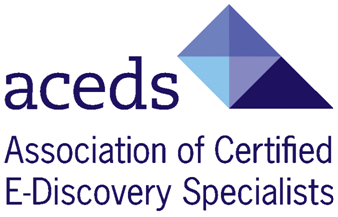eDiscovery Daily Blog
eDiscovery Trends: You Have to Be Certifiable to Work in eDiscovery

In any industry, it becomes important to be able to gauge the knowledge and capabilities of your service provider. As we noted recently with regard to cloud-based Software-as-a-Service (SaaS) providers, certification builds a client's trust and confidence in the service provider. While no industry standard certification has emerged for eDiscovery professionals – yet – some independent certification programs are in various stages of implementation to measure proficiency with eDiscovery best practices.
One program that is already in place today to verify eDiscovery competency is the Association of Certified E-Discovery Specialists® (ACEDS™), which is a relatively new organization that is gaining popularity as a member organization of eDiscovery professionals and a certification program with the Certified E-Discovery Specialist (CEDS) certification. Last week, I spoke with Charles Intriago, President and Gregory Calpakis, Executive Director about ACEDS, how the program has evolved to this point and where it’s headed.
The group that founded ACEDS (The Intriago Group) is not new to certification programs, having previously established the Association of Certified Anti-Money Laundering Specialists (ACAMS), which, according to Intriago, has become the “world standard” certification for private and public sector professionals (including the FBI, FDIC, OCC, and IRS) for detection and prevention of money laundering.
Development of the certification program was a laborious eight month process than began last year. Highlights of that process include:
- Psychometric Development: ACEDS used Kryterion, an organization dedicated to construction and validation of knowledge measurement tests, to develop the certification test. Experts in constructing exams, Kryterion uses psychometrics to create exams that are fair and unambiguous to truly measure the knowledge and ability of the test taker.
- Expert Involvement: Twelve experts throughout the country identified over 78 eDiscovery-related job tasks.
- Initial Survey: From this information, a 272 question survey was sent out to thousands of people for information gathering purposes, with more than 430 responses to the survey received, which defined the frequency, relevance and importance of those tasks. Based on the responses, statisticians ranked the tasks by occupation and importance to the eDiscovery process.
- Question Development: ACEDS then gathered some forty experts to draft four-choice, multiple choice scenario-based questions for the exam. 222 initial questions were drafted.
- Expert Refinement of Questions: Every question, or “item,” was then reviewed by a panel of at least six experts in a series of conference calls from August to October of last year.
- Beta Testing: The initial version of the exam was launched on November 1 of last year, with more than 50 people taking the test in one of many Kryterion test centers. A scientific analysis was then performed of the test results to determine how each question performed and confirm that each test question was fair, clear and unambiguous.
- End Result: The current version of the exam was finalized in mid-March of this year and is 145 questions and must be completed in four hours. So far, more than 100 people have taken it, with approximately 75% of them passing the test and receiving the certification.
The certification exam is focused on job tasks and practical job challenges, not changing case law, which Intriago, who is a lawyer and previously a partner at a large international law firm, federal prosecutor and Congressional subcommittee chief counsel, noted applies only to the districts where the cases are decided, in the absence of a Supreme Court ruling. When you sign up for the exam, you receive a CEDS exam preparation manual, which covers the considerable range of eDiscovery topics covered in the exam. Benefits of certification include private and public sector employer confidence in the competence of their employees, improved job and increased salary prospects, increased credibility, chance for reduced malpractice premiums, potential promotion to new positions, as well as a potential raise in billing rates.
The price of the exam and CEDS exam preparation manual is $995 ($795 if you’re an ACEDS member – membership can range from $150 to $195 for general and government memberships).
ACEDS is committed to keeping the certification program up to date and boasts a 16 member advisory board that includes a former president of the American Bar Association, former chief justice of the Supreme Court of Florida, and key decision makers from major law firms and corporations. The ACEDS site also has independent reporting in the News & Analysis section of the site, including this article referenced by eDiscovery Daily just last week.
For more information, go to aceds.org.
So, what do you think? Is eDiscovery certification important to you? Please share any comments you might have or if you’d like to know more about a particular topic.
